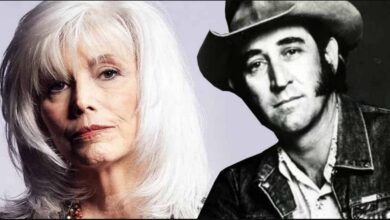Priscilla Says Elvis Pours His Heart Into This Song
Elvis Presley, often celebrated as the “King of Rock and Roll,” has left an indelible mark on music history and popular culture. Born on January 8, 1935, in Tupelo, Mississippi, he emerged from humble beginnings to become a global phenomenon. Presley’s journey from a working-class background to superstardom was characterized by his innovative musical style that fused various genres, particularly rockabilly, rhythm and blues, and gospel. This unique amalgamation gave birth to a sound that was both infectious and revolutionary, appealing to a diverse audience and breaking down racial barriers in the music industry.
In the mid-1950s, Elvis burst onto the music scene with a string of hits that showcased his vocal prowess and charismatic stage presence. Songs like “Heartbreak Hotel,” “Hound Dog,” and “Don’t Be Cruel” defined the era, contributing to the rock and roll explosion that captivated young audiences in the United States and beyond. With his signature pompadour hairstyle and rebellious attitude, Elvis became a symbol of youth culture, representing a new era of freedom and expression in post-war America.
Elvis’s impact was not limited to his music alone; he also revolutionized live performances. His concerts were vibrant showcases of energy, passion, and showmanship, which set the standard for future entertainers. His ability to connect with audiences was unrivaled, and his performances often sparked excitement and fervor—an effect that was particularly potent among his female fans. The phenomenon of “Elvis Fever” swept the nation, as people of all ages were enthralled by his talent and persona.
As the 1960s approached, Elvis’s career faced challenges, including a shift in musical tastes and growing competition from younger artists. However, the 1968 NBC television special, commonly referred to as the “68 Comeback Special,” proved to be a turning point. It presented a revitalized Presley, one who embraced his roots while showcasing his versatility as an artist. The special brought him back to his musical roots, featuring rock and roll numbers alongside stirring ballads, reaffirming his place as a leading figure in the industry.
One of the most memorable performances from the “68 Comeback Special” was his rendition of “If I Can Dream.” This poignant song, written by Walter Earl Brown, served as more than just entertainment; it became a beacon of hope during a period marked by social change and upheaval in America. The late 1960s were fraught with issues, including the civil rights movement and anti-war protests, and the song’s themes of unity and aspiration resonated deeply with the public.
Dressed in a striking black leather outfit, Elvis commanded the stage with an aura of authority and sincerity as he delivered the song’s powerful lyrics. His emotive performance was underscored by a lush orchestral arrangement and harmonious backing vocals from a choir, creating an atmosphere that was both solemn and uplifting. The combination of Elvis’s heartfelt delivery and the musical arrangement struck a powerful chord, making it not just a performance but a moment of cultural significance.
In his performance, Elvis poignantly addressed the desire for a better world, echoing the hopes of many during a time when dreams often seemed unreachable. “If I can dream of a better land, where all my brothers walk hand in hand, tell me why can’t my dream come true?” he sang, encapsulating a universal longing for peace and understanding. The message of the song, combined with his passionate delivery, created a memorable experience that transcended mere entertainment.
The significance of the “68 Comeback Special,” and particularly Elvis’s performance of “If I Can Dream,” lies in its reflective nature—highlighting both the artist’s personal journey and the broader societal struggles of the time. It underscored Elvis’s ability to adapt and grow as an artist while still addressing critical issues impacting society. This multifaceted approach to music and performance made him a figure of resilience, and his work during this period exemplified a bridge between entertainment and advocacy.
Elvis’s legacy has remained strong, inspiring countless musicians and performers. He redefined the possibilities of fame in music, and his ability to generate emotional responses through his performances set a benchmark for artists who followed. His influence is evident in the works of many contemporary musicians who cite him as a major inspiration in their careers.
Today, many still find solace and inspiration in Elvis’s music. “If I Can Dream” continues to resonate, not only as a powerful ballad but also as a reminder of the importance of hope, unity, and the pursuit of dreams in the face of adversity. The enduring appeal of this performance highlights the timeless nature of Elvis’s artistry and the ongoing relevance of his messages.
Though Elvis Presley passed away on August 16, 1977, his spirit lives on through his music, which continues to captivate audiences around the world. His ability to confront societal issues with authenticity while maintaining an air of entertainment cements his status as an icon of our time. Elvis may have left the building, but his legacy of music and message remains interwoven into the fabric of modern culture, inspiring future generations to dream, to aspire, and to unite.





